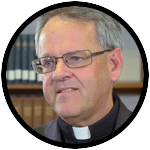
Father Thomas Dailey, O.S.F.S.
By now it should be old news. But the hits keep coming whenever Pope Francis speaks.
The latest hullabaloo surfaced during Holy Week, when Eugenio Scalfari reported in La Repubblica on his conversation with Pope Francis about the fate of persons after death. According to Scalfari, the pope said, “Those who repent obtain God’s forgiveness and join the ranks of souls who contemplate him, but those who do not repent and cannot therefore be forgiven disappear. Hell does not exist; the disappearance of sinful souls exists.”
Not surprisingly, reaction was swift and scathing. Online tabloids and critical websites lit up with the supposed “news” of this papal pronouncement.
Hoping to compel calm, the Holy See’s Press Office issued a formal communiqué declaring the encounter between pontiff and reporter a “private meeting” rather than an interview. It characterized the article as a “reconstruction” of their conversation, whose content should not be taken “as a faithful transcription of the words of the Holy Father.”
[hotblock]
End of story? Hardly! Analysis quickly turned to denigration, defense and deflation.
The denigration came from those who seized upon the story as evidence of this pope’s catastrophically erring ways. For some critics, Francis had crossed the line from loose-lipped communication to definitively scandalous speech. One Italian commentary raised the specter of impeaching the pope on account of heresy.
The defense mounted. Labeling the story “fake news,” another columnist at La Repubblica posted that Scalfari conceded to being inaccurate or creative with his citations of the pope’s comments. Elsewhere, an Italian priest lamented the “catholically correct” criticism that mistook friendship for an interview, the former being something between Eugenio and Jorge Mario “that cannot be caged up in any institutional interest or personal benefit.”
Into the breach strode John Allen Jr., with an attempt to deflate the discord. With an astute analysis, this well-respected Vaticanista unpacked the surreal story by noting that Francis frequently speaks about the reality of hell, that folks in-the-know know Scalfari’s reporting for what it really is, and that in Francis’s approach to dialogue, especially with an elderly unbeliever, the preferred model is “friendship first, clarity later.”
Clarity is also needed to appreciate, or at least understand, how Pope Francis communicates.
Many wonder why he continues to speak so off-handedly to reporters, when doing so is unnecessary and obviously fraught with the risk of his being misinterpreted. In their view, popular appeal should give way to pontifical prudence, especially given the speed with which stories spread in a digital world.
But this “safe” approach misunderstands the nature of interpersonal communications. Desirous of precision, it misses the persons.
[hotblock2]
For Pope Francis, a pastor converses with people “where they are” in life, even if that’s not in an ideal place. Faith, not fear, stimulates the exchange, as he explains in his preface to a recent book about his interviews.
There he says that “interviews always have a pastoral value.” He acknowledges how this medium “can render me vulnerable.” But, he adds, “it’s a risk that I must run” because that “is a way of communicating my ministry.”
These days, the Petrine ministry unfolds in a world where social communication favors brevity and rewards genuineness. There, says Francis, “I try to respond in a spontaneous way, in a conversation that I wish to be understandable, and not with rigid formulas. I even use a simple, popular language. For me the interviews are a dialogue, not a lecture.”
For Pope Francis, this “direct communication with people” is a “true and real necessity” for ministry in the Church. We who collaborate in that ministry, and those who receive its benefits, profess the same faith as the pope. We would do well to keep that in mind whenever we see jarring headlines or incongruous claims about what he supposedly said. In popular parlance, we should “practice the pause.”
But even when the reporting is accurate, and we are constrained to ponder the papal points more strenuously, we can benefit from the spiritual insight of another Francis. St. Francis de Sales, in his masterful “Introduction to the Devout Life,” reminds us that one way to practice the command to love your neighbor as yourself is this: “If an action has many different aspects, we must always think of the one which is the best.”
In today’s digital world, thinking what is best can be stymied by fake news, even in reporting about religion. But it takes more than fact-checking to know the truth, especially in matters of faith. In that realm, as St. John Paul II once explained, knowledge is grounded on trust between persons.
Perhaps we should start there when trying to make sense of thoughts and words that are hard to comprehend — even, or especially, those of a pope.
***
Father Dailey is the John Cardinal Foley Chair of Homiletics and Social Communications at St. Charles Borromeo Seminary, Wynnewood, and a research fellow for the Catholic Leadership Institute in Wayne.


Pope Francis is serving humanity with dedication and distinction. Long live the Pontiff.